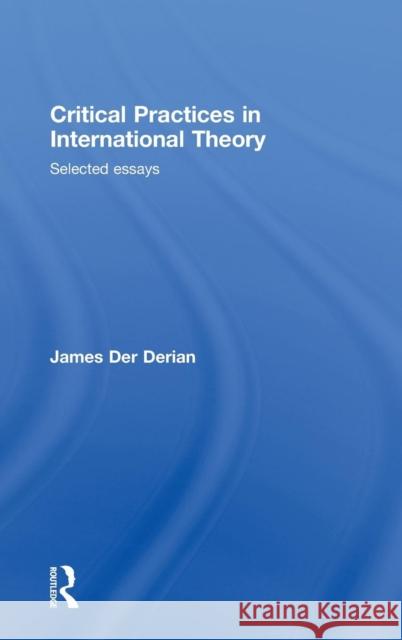Critical Practices in International Theory: Selected Essays » książka
Critical Practices in International Theory: Selected Essays
ISBN-13: 9780415772402 / Angielski / Twarda / 2009 / 328 str.
Critical Practices in International Theory: Selected Essays
ISBN-13: 9780415772402 / Angielski / Twarda / 2009 / 328 str.
(netto: 698,25 VAT: 5%)
Najniższa cena z 30 dni: 705,23
ok. 22 dni roboczych
Dostawa w 2026 r.
Darmowa dostawa!
Critical Practices in International Theory brings together for the first time the essays of the leading IR theorist, James Der Derian. The essays cover a variety of issues central to Der Derian's work including diplomacy, alienation, terrorism, intelligence, national security, new forms of warfare, the role of information technology in international relations, poststructuralist theory, and the military-entertainment-media matrix. The book includes a framing introduction written for this volume in which Der Derian provides historical and theoretical context for a diverse body of work. Discussing his own influences and reflecting upon the development of international theory, he advocates a critical pluralist approach to the most pressing problems of world politics. Written in the eloquent style that marks out Der Derian as one of the most provocative and innovative thinkers in international relations, this collection is essential reading for scholars and students interested in the past, present and future of international relations. James Der Derian is a Watson Institute research professor of international studies at Brown University, where he directs the Global Security Program and the Global Media Project. He is the author of many articles and books, including the highly acclaimed Virtuous War (2001, 2009).
This book brings together for the first time the essays of the leading IR theorist, James Der Derian. The essays cover a variety of issues central to Der Derian’s work in IR theory including: alienation, terrorism, intelligence, national security, new forms of warfare, the role of information technology in international relations, constructivist theory, and the military-entertainment-media matrix. The book includes both published and unpublished essays including some of the original articles which inspired several of his well known but now out of print books.
In Critical Practices of International Relations Der Derian not only frames an introduction for the volume as well as a prospective conclusion in which he, in his inimitable way does, but also speculates on the future of international relations theory.











